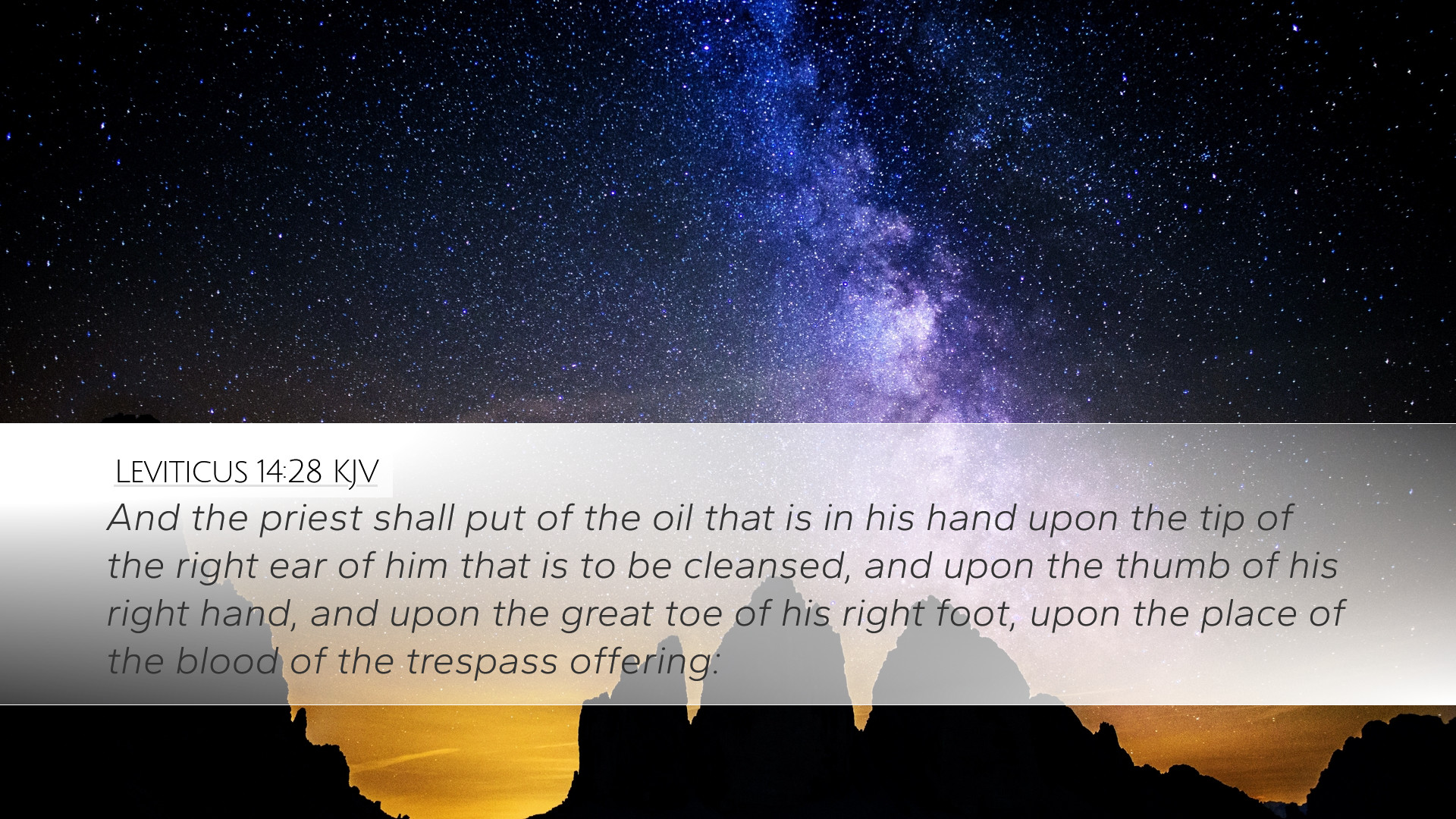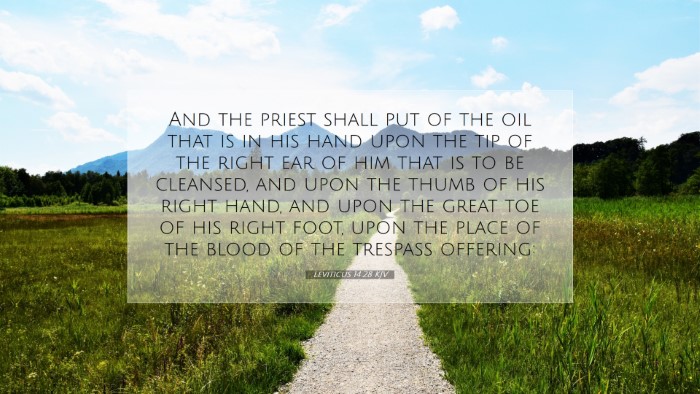Bible Commentary on Leviticus 14:28
Verse: "And the priest shall put of the oil that is in his hand upon the tip of the ear of him that is to be cleansed, and upon the thumb of his right hand, and upon the great toe of his right foot."
Introduction
The ceremony described in Leviticus 14:28 is a significant part of the broader cleansing ritual for leprosy, illustrating not only the physical aspects of healing but also the spiritual implications of purification. This verse details specific actions taken by the priest that symbolize the restoration of the individual to the community and to God. Commentators through the ages have explored the depth of meaning embedded within this command.
Commentary Insights
Matthew Henry's Commentary
Matthew Henry emphasizes the symbolism of the anointing with oil as a representation of the Holy Spirit's work in the life of the believer. The act of applying oil to the ear, thumb, and toe signifies the sanctification of the senses and actions of the individual. Henry notes that:
- **The Ear**: Represents hearing the Word of God, suggesting that the cleansed individual is now prepared to listen and obey divine instruction.
- **The Thumb**: Symbolizes the works and deeds of a person, indicating that the cleansed individual is now empowered to serve righteously.
- **The Great Toe**: Stands for the walk of the believer, highlighting the importance of living a life that is pleasing to God.
Henry concludes that each part represents a transformational aspect of the believer’s life—activity, servitude, and devotion—now rendered pure and acceptable after the cleansing process.
Albert Barnes' Notes on the Bible
Albert Barnes approaches this verse by examining the ritual's connection to the law and its implications for the New Covenant believer. He notes that:
- The cleansing of a leper illustrates a profound metaphor for sin and its cleansing by divine grace.
- Each application of oil by the priest foreshadows Christ's atoning work, as it marks the beginning of a healed relationship with God.
- The precision in anointing the specific parts of the body signifies total restorative action, underscoring the holistic nature of divine redemption.
Barnes encourages readers to see this ritual not merely as a historical account but as an enduring lesson on the need for spiritual cleansing and the access to God that comes through Christ.
Adam Clarke's Commentary
Adam Clarke offers a historical and cultural context to the ritual, shedding light on the importance of community and belonging. He remarks that:
- The act of being cleansed from leprosy is not just physical; it implies social restoration, allowing the individual to reintegrate into the community.
- Clarke suggests that the priest’s role is critical, serving as a mediator between the cleansed individual and God, similar to the role of Christ in today’s faith context.
- The oil signifies the presence of God's spirit and the establishment of a new identity free from past afflictions.
Clarke’s insights remind us that the rituals of the Old Testament anticipate the ultimate cleansing that comes through Jesus Christ, uniting believers in their call to live out their faith in community.
Theological Implications
In summary, Leviticus 14:28 presents a rich tapestry of theological themes relevant to pastors, theologians, and students. The process of cleansing not only restores the individual physically but also adapts them spiritually for an active life of service and worship. Each element of the ritual invites contemplation on the holistic nature of salvation:
- Hearing God's Word: How do we listen to God in our daily lives?
- Doing Good Works: In what ways are we being called to serve after our own experience of grace?
- Walking in Faith: What does it mean to walk in purity after being cleansed?
The insights culled from these respected public domain commentaries encourage a deeper understanding of one’s personal faith journey, urging a proactive stance towards living out the implications of having been spiritually cleansed.
Conclusion
As we reflect on Leviticus 14:28, let us not overlook the profound significance of the priest’s actions and the anointing oil. This passage serves as a reminder of God’s desire for community and personal holiness, alluding to the beautiful relationship that develops through obedience, service, and grace.


